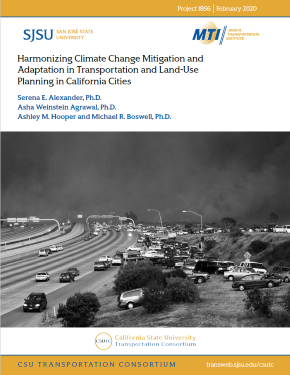- 408-924-7560
- mineta-institute@sjsu.edu
- Donate
Harmonizing Climate Change Mitigation and Adaptation in Transportation and Land-Use Planning in California Cities
Recent extreme weather events in California—wildfires, drought, and flooding—make abundantly clear the need to plan effective responses to both the causes and the consequences of climate change. A central challenge for climate planning efforts has been identifying transportation and land-use (TLU) strategies that simultaneously reduce greenhouse gas emissions (“mitigation”) and adapt communities so that they will be less affected by the adverse impacts of climate change (“adaptation”). Sets of policies that collectively address both mitigation and adaptation are known as “integrated actions.” This study explores municipal climate planning in California to determine whether cities incorporate integrated actions into their plans, assess the potential drivers of conflict between mitigation and adaptation in municipal plans, and identify ways the State of California can help cities more effectively incorporate integrated actions.
The study methods consisted of a detailed analysis of climate planning documents from 23 California cities with particularly long histories of climate planning, plus interviews with 25 local, regional, and state officials who work on municipal climate planning.
The authors found that some cities did adopt packages of integrated actions, and, promisingly, two cities with recently updated climate plans explicitly focused on the need for integrated actions. However, most cities addressed climate mitigation and adaptation in separate efforts, potentially reducing synergies between the two types of action and even creating conflicts. Since the first generation of climate action plans focused primarily on mitigation of greenhouse gases (GHGs), adaptation strategies have not yet been effectively or fully combined into mitigation plans in many cities. Also, a cross-comparison of plan content and interview data suggests that cities often had sets of policies that could potentially create conflicts—mitigation policies that would undermine adaptation capacity, and vice versa. In addition, where a city did adopt integrated actions, these efforts are typically not labeled as such, nor do the policies appear within the same policy document.
The study findings suggest promising steps that both municipal and state governments can take to support integrated TLU actions at the local level. For example, cities can proactively link the content in climate mitigation and adaptation plans—a process that will require building the capacity for cross-collaboration between the various departments in charge of developing, implementing, and monitoring climate-related plans. As for the state government, it can provide funding specifically for planning and implementing integrated actions, offer technical support to help municipalities adopt programs and projects that produce integrated mitigation and adaptation benefits, and fund research in the area of integrated actions.
SERENA E. ALEXANDER, PhD
Serena Alexander is an Assistant Professor of Urban and Regional Planning at San José State University. Her primary research interests are in the areas of environmental planning, climate action, and land-use and transportation planning. Before joining the SJSU faculty, Dr. Alexander conducted community economic development and environmental policy research at the Center for Economic Development and the Great Lakes Environmental Finance Center at Cleveland State University, where she also received her doctorate in Urban Studies (Specialization in Urban Policy and Development). She holds master’s degrees in Urban and Regional Planning from California State Polytechnic University, Pomona, and Architecture from Azad University of Tehran.
ASHA WEINSTEIN AGRAWAL, PhD
Dr. Agrawal is Professor of Urban and Regional Planning at San José State University. Her research and teaching interests in transportation policy and planning include bicycle and pedestrian planning, travel survey methods, and transportation finance policy. She also works in the area of transportation history. She has a BA from Harvard University in Folklore and Mythology; an MSc from the London School of Economics and Political Science in Urban and Regional Planning; and a PhD from the University of California, Berkeley, in City and Regional Planning.
ASHLEY M. HOOPER
Ms. Hooper is a doctoral candidate in Urban and Environmental Planning and Policy at the University of California, Irvine, within the Department of Urban Planning and Public Policy. Her research interests relate broadly to issues of sustainability and resilience within urban socio-ecological systems. Her teaching interests include qualitative research methods, urban planning and public policy, environmental policy, and environmental justice. She holds a BS in Psychology and a Masters of Water Resources (Specialization in Policy and Management) from the University of New Mexico.
MICHAEL R. BOSWELL, PhD
Michael R. Boswell is Department Head and Professor of City & Regional Planning at California Polytechnic State University (Cal Poly) in San Luis Obispo. He has a Master of Science (MSP) and PhD in Urban & Regional Planning from Florida State University. He has published on topics such as climate action planning, hazard mitigation, adaptive management and governance, local government planning, autonomous vehicles, and sustainable development.
-
Contact Us
San José State University One Washington Square, San Jose, CA 95192 Phone: 408-924-7560 Email: mineta-institute@sjsu.edu






